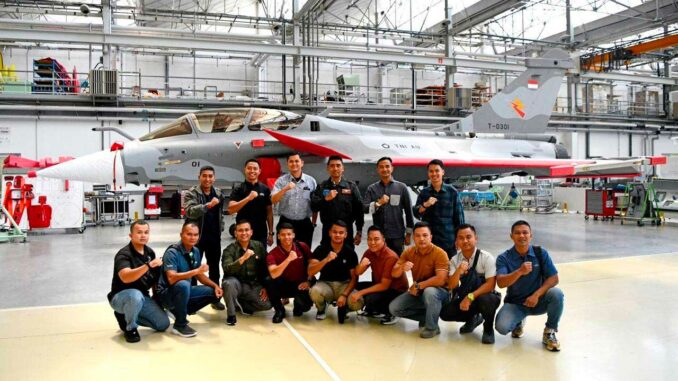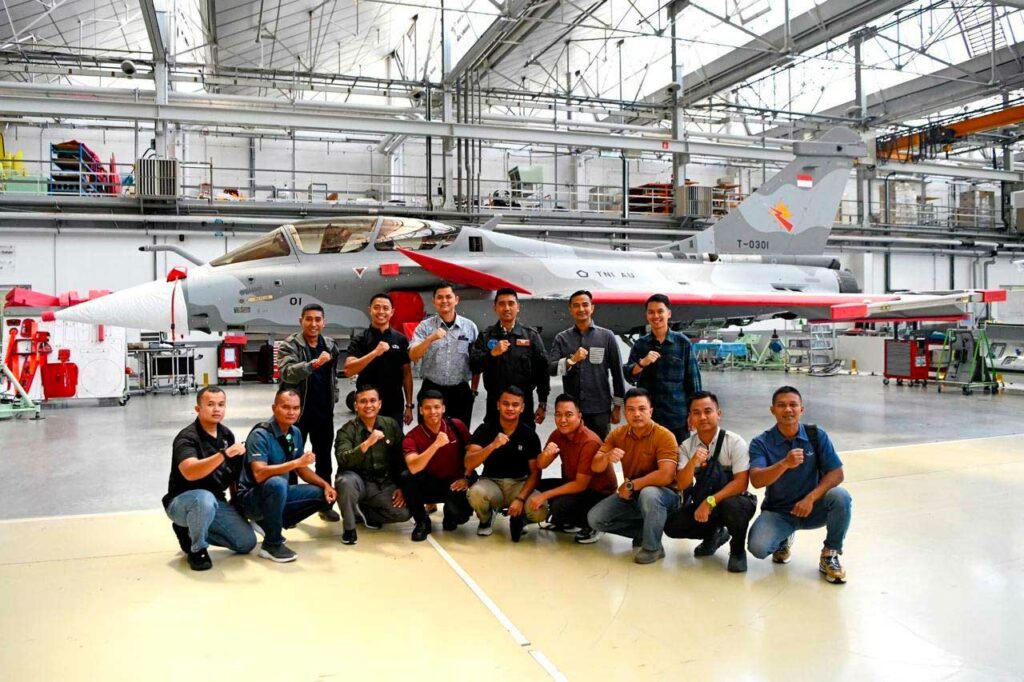
Indonesia launches its Rafale F4 program, with training in France, delivery starting in 2026, and a major impact on regional defense.
Understanding the context of the Indonesian Rafale program
Indonesia ordered 42 Rafale F4s from Dassault Aviation in February 2022 for USD 8.1 billion. The configuration includes 30 single-seaters (Rafale A) and 12 two-seaters (Rafale B). This confirms a clear desire to modernize the air force with a modern multi-role aircraft.
On August 13, 2025, the first images of the Rafale B T-0301 were revealed. The aircraft bears the livery of the Indonesian Air Force (TNI-AU) and the insignia of the 6th Air Wing, assigned to the 12th Squadron.
The program includes three delivery segments: an initial order of six aircraft, followed by two batches of eighteen. The first delivery is expected in early 2026, allowing the fleet to gradually enter service.
Technical details and operational training
The Rafale F4 features advanced data fusion, modernized sensors and high-speed connectivity. It performs missions such as air superiority, ground support, reconnaissance, anti-ship strikes and nuclear deterrence.
Four Indonesian pilots and twelve technicians are undergoing a training program in France. The course combines theory, simulators, hangar work, and full mission flights. The training is led by Lieutenant Colonel Binggi Nobel. Practical operations will begin at the Saint-Dizier base on August 20 and continue into 2025.
This approach aims to ensure rapid operational deployment of the aircraft. It reflects a structured capacity-building strategy.
Strategic impacts on regional defense
The Rafale is profoundly changing the posture of the Indonesian Air Force. With a coherent fleet in the long term, Indonesia is strengthening its power projection in the Indo-Pacific, particularly in the face of tensions in the South China Sea.
The deliveries will streamline a heterogeneous fleet of F-16s, Sukhoi Su-27/Su-30s, and other aging aircraft. The deterrent effect is reinforced by the operational versatility of the new fleet.
In addition, Indonesia is considering the acquisition of 18 additional Rafale aircraft, bringing the total to 66. A letter of intent was signed at the end of May 2025. This would make it one of the largest non-European operators.

Franco-Indonesian cooperation and prospects
The modernization is part of a broader cooperation program that includes the purchase of Scorpene submarines, Thales radars, joint exercises, and maritime security projects.
A meeting between Emmanuel Macron and Prabowo Subianto in May 2025 deepened these ties, including discussions on new aircraft and equipment.
This partnership positions France as a leading ally and Indonesia as a major security player in the region. Technology sharing, particularly in naval and air capabilities, reflects a long-term cooperation strategy.
Practical challenges for implementation
Training in France meets several requirements: ensuring maintenance, mastering logistical routines, and guaranteeing the operational integrity of the Rafale aircraft.
These skills are essential for effective commissioning: technical training for technicians in avionics, weapon systems, integrated maintenance, and field support.
For pilots, mastery of the systems, simulators, and real-world flight conditions contributes to a smooth transition. This preparation ensures that the first squadron will be operational without excessive delays.
Financial and comparative issues
The initial contract for 42 Rafale aircraft is worth $8.1 billion. Each aircraft competes with platforms such as the Chinese J-10 and the American F-15EX, which Jakarta evaluated for cost, compatibility, and maintenance.
The additional order for 18 Rafales would increase the overall investment but consolidate economies of scale. Access to a standardized fleet reduces long-term costs and facilitates logistics.
The arrival of the Rafale B T-0301 marks a turning point for the Indonesian Air Force. The acquisition plan for 42 Rafale F4s, with targeted training in France and deliveries starting in 2026, reflects a desire for pragmatic and structured modernization.
The operational impact is manifold: increased skills, fleet cohesion, and strategic reinforcement. The potential purchase of 66 Rafale aircraft places Indonesia in a position of controlled regional power.
War Wings Daily is an independant magazine.